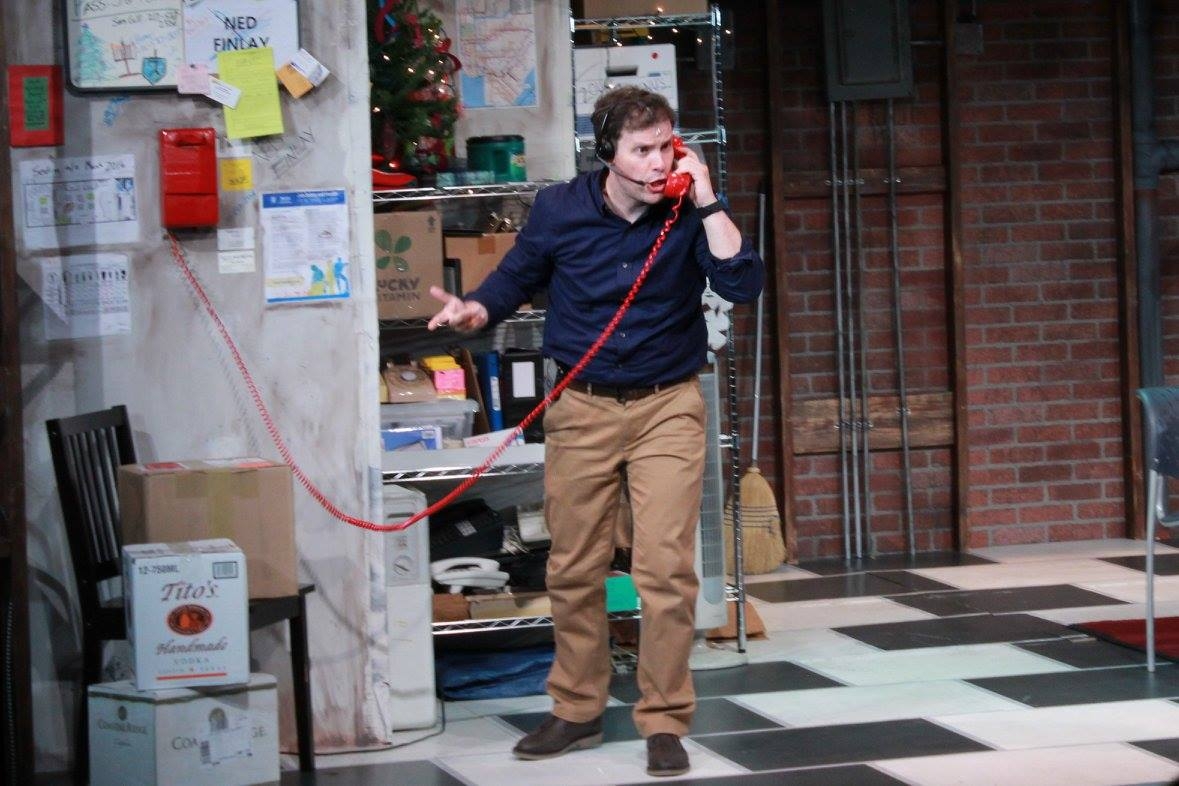Sam Callahan is having a very bad day.
It’s not long before Christmas, and the generally cheerful Midwesterner, ever hopeful that he’ll catch a break in his floundering acting career, has been forced to return to his stressful and disappointing day job managing reservations in the dingy basement of an uber-hip molecular gastronomy restaurant in New York.
The place is fully committed months in advance, but the status-obsessed Manhattan elite want tables now! And today, Sam is juggling all the lit-up phone lines on his own — there’s no table for his egomaniacal boss’s celebrity chef mentor, no staff meal for Sam, and no one but Sam to clean up all the literal and figurative ridiculous messes. It’s enough to make a guy fully committed in an asylum.
Or, in this case, it’s what creates a delightful opportunity for one very talented actor to become fully committed to not just one, but more than three dozen roles. All at once. This is both the premise and the delivery of “Fully Committed,” the raucous one-man comedy in full force at Mason Street Warehouse in Saugatuck, where Francis Kelly, under exquisite direction from David Alpert, miraculously brings to life each of these distinct and hilarious characters with little more than his incredible range of vocal and physical skill.
His Sam is earnest, hard working, and noble, and develops and is revealed through conversations with other characters, including but not limited to a belligerent, snappy French maitre d’ who repeatedly refuses to take a socialite’s calls because she has a face like a catfish; a sharp, cold-hearted food editor; Sam’s two-faced fidget-spinning agent’s assistant; his easy-going yet lonely down-to-earth dad; Gwyneth Paltrow’s perky, flamboyant, high-strung personal assistant who requires a last-minute vegan tasting menu sans legumes, plus softer lighting and no female waitstaff; a paranoid, histrionic hysteric; a mobster; and the narcissistic dudebro-stoner-cokehead head chef who makes impossible demands and possesses a fragile ego.
Though they may sound preposterous, the characters in Becky Mode’s clever script — named by Time Magazine as one of the top 10 plays of 2000, and recently updated — ooze verisimilitude, likely influenced from the time she and co-creator Mark Setlock spent working in upscale French restaurant Bouley in TriBeCa.
Not only does Kelly clearly delineate each character with various spot-on accents, vocal inflection, postures and gestures, but he establishes, builds and switches characters within seconds. He does it all with grace, impeccable timing, and beautiful nuance. The astounding achievement is encapsulated in the curtain call where each character emerges with a single stance or gesture.
No doubt Director David Alpert strongly guided these brilliant choices as well as the blocking and Kelly’s terrific use of the stage: at turns sitting behind a desk, leaping on top of it, pacing, racing to pick up phones stage left and stage right, and climbing up and down stairs upstage. He makes wonderful use of Jason Sherwood’s deliberately cluttered set with faux exposed brick and cinderblock walls dressed up for Christmas like a claustrophobic basement office should be. Jennifer Kules' lights also create the look and feel of this wretched and funny place, and Josh Allamon’s sound cues are perfectly executed, ever so important to the seamless flow of the show.
It’s a remarkable production, nothing short of a truly impressive feat, made even more so by its larger effect. The play has been criticized for not having a larger purpose or message, but in David Alpert’s capable hands, a larger, fascinating theme clearly emerges: power is fluid, and can be wielded by the seemingly little guy down on his luck through clever behind-the-scenes machinations. What looks like a very bad day turns into a very good one for Sam, and all of it makes for a most excellent night at Mason Street Warehouse.





